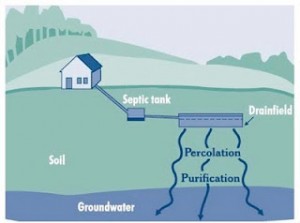There’s new opposition to bills that would repeal a state septic tank inspection requirement: A Tallahassee official told senators this week that the bill could make it more difficult to restore Wakulla Springs.
The Legislature in 2010 adopted a statewide septic tank inspection requirement that supporters said would protect springs and groundwater. Scientists say Wakulla Springs has become choked with weeds and algae because of nitrogen from sources including wastewater, septic tanks, fertilizer and dirty stormwater runoff.
The 2010 legislation led to a backlash from tea party opponents who said the inspections were an expensive and unnecessary government intrusion. The inspections, required every five years, cost between $83 and $215 in three counties where inspections already are required, according to a House staff analysis.
HB 999 would repeal the statewide requirement and establish limits on inspection programs in counties. Nineteen counties with large springs, such as Wakulla County, would have to vote not to require inspections. The bill passed the House last week 105-11, according to the Florida Current.
The bill has support from groups including the Florida Onsite Wastewater Association, the Florida Home Builders Association, Associated Industries of Florida, Florida Realtors, Audubon of Florida and the Coalition for Property Rights. Sierra Club Florida and the Florida Stormwater Association oppose the bill.
John Buss, the city of Tallahassee’s director of water resource engineer, told the Senate Budget Committee on Thursday that the bill will make it more difficult to reduce nitrate-nitrogen levels in Wakulla Springs State Park.
 Florida Department of Environmental Protection on Thursday set a nitrate-nitrogen limit of .35 milligrams per liter for the springs 15 miles south of the Capitol. The new limits, which are about one-third highest nitrate levels in Wakulla Springs, take effect on March 21.
Florida Department of Environmental Protection on Thursday set a nitrate-nitrogen limit of .35 milligrams per liter for the springs 15 miles south of the Capitol. The new limits, which are about one-third highest nitrate levels in Wakulla Springs, take effect on March 21.
State law now requires a 24-inch separation between a septic tank drainfield and groundwater to prevent contamination. HB 999 prohibits inspectors from requiring the separation during inspections of existing septic tanks.
Without that separation, Buss said, the soil is unable to treat septic tank wastewater to remove nitrogen. A septic tank with a clogged drainfield, he said, won’t be in violation unless raw sewage is flowing from the surface.
The city of Tallahassee has spent $220 million to upgrade its sewage treatment plants to protect Wakulla Springs, Buss said. Reducing nitrogen from septic tanks, he said, also will be important in reducing nitrogen in the springs.
“The biggest source of loading now for Wakulla Springs is septic tanks,” Buss said. “And you are tying our hands with regards to trying to manage that problem.”
Keith Hetrick, general counsel for the Florida Home Builders Association, said the separation requirement was established as a permitting standard during construction, not an inspection requirement. He said the separation requirement in 2010 law created the backlash against inspections.
“That groundwater table fluctuates over time,” he continued. “If you are unlucky enough to be 23 inches when they go down and poke a stick in the ground you have to replace your whole system. That is not fair to the citizens.”
The Senate version of the bill, SB 820, passed the Budget Committee 19-2 and is headed to the Senate floor. Senators, such as Sen. Bill Montford, D-Tallahassee, voted for the bill with no mention of Wakulla Springs or the city’s opposition.
“Thank you for doing this,” Montford told Sen. Charlie Dean, R-Inverness and the SB 820 sponsor. “It may not be perfect. What we have here is a result of two years of waiting and studying and discussion.”
(Graphic art courtesy from U. S. Environmental Protection Agency educational materials. Photo and story copyrighted by Bruce Ritchie and Floridaenvironments.com. Do not copy or redistribute without permission).


Can’t wait until it is to late to protect Wakulla Springs!